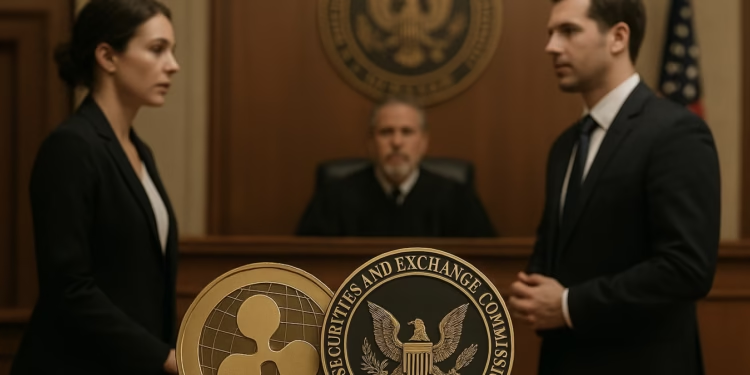The SEC-Ripple Settlement is on the verge of finalization, marking the potential conclusion of one of the most pivotal legal battles in the crypto industry.
On August 15, the U.S. Securities and Exchange Commission (SEC) notified the Court of Appeals that both it and Ripple have agreed to dismiss their appeals, covering their own legal costs. This joint move effectively signals the closing chapter of nearly five years of litigation.
The SEC-Ripple Settlement, however, still requires one final step: court approval. Until Judge Analisa Torres formally signs off on the stipulation, the case remains technically open.
SEC-Ripple settlement awaits judge Torres’ signature
The recent filing is procedural but highly significant. Pro-XRP lawyer Bill Morgan commented:
“The SEC-Ripple Settlement has essentially been agreed upon. All that remains is Judge Torres issuing her final order, which could happen at any time.”
This means that, while the dispute is practically over, the official dismissal hinges on the court’s acceptance. The anticipation surrounding Judge Torres’ next move is palpable across both the crypto industry and traditional finance circles.
The SEC-Ripple Settlement stems from a case that began in December 2020, when the SEC alleged Ripple raised $1.3 billion by selling XRP tokens without registering them as securities.
In July 2023, Judge Torres issued a landmark ruling, stating that retail XRP sales were not securities transactions, though sales to institutional investors did fall under securities law.
Ripple was ultimately ordered to pay a $125 million penalty — a ruling that many saw as a partial victory for the crypto industry.
This mixed outcome has set an important precedent, with the SEC-Ripple Settlement now expected to further clarify the regulatory boundaries for digital assets in the United States.
Ripple executives and industry experts Reacts
Ripple CEO Brad Garlinghouse has long framed the battle as being bigger than Ripple itself:
“This was never just about XRP. The SEC-Ripple Settlement represents regulatory clarity for the entire industry,” Garlinghouse said in a recent statement.
Industry analysts agree. John Deaton, founder of CryptoLaw, argued that the SEC-Ripple Settlement could act as a benchmark for future cases:
“This isn’t just the end of Ripple’s fight. The settlement will influence how regulators and courts view digital assets moving forward.”
What the SEC-ripple settlement means for XRP holders
For XRP investors, the SEC-Ripple Settlement carries immediate implications. Analysts expect that once the appeals are formally dismissed, institutional investors, banks, and even exchange-traded funds (ETFs) may feel more comfortable engaging with XRP.
According to CoinShares data, XRP has already seen growing institutional inflows since the legal dispute edged toward resolution.
Ripple’s partnerships with global payment providers and banks could now expand even further under the certainty brought by the settlement.
The SEC-Ripple Settlement is widely seen as a milestone for crypto regulation in the United States.
By affirming that not all token sales constitute securities, the outcome introduces a nuanced framework that could guide future enforcement actions.
As noted by Bloomberg Law, the case could shape how projects structure their token offerings and how regulators balance investor protection with innovation.
“The resolution of the SEC-Ripple Settlement could embolden projects to engage more transparently with U.S. regulators, knowing there’s now precedent on their side,” said legal analyst Katherine Kirkpatrick.
XRP’s institutional future hinges on court Approval
While XRP has enjoyed notable institutional breakthroughs, including its integration into cross-border payment systems, many investors remain on the sidelines awaiting Judge Torres’ final ruling.
A completed SEC-Ripple Settlement could unlock a wave of institutional adoption, driving new liquidity into XRP markets.
Market watchers also suggest that once finalized, the settlement could bolster confidence in other altcoins currently under regulatory scrutiny, such as Solana (SOL) and Cardano (ADA).
The SEC-Ripple Settlement is more than the end of a legal feud — it’s a watershed moment for crypto regulation in the U.S. With both parties aligned and only court approval pending, the industry now awaits Judge Torres’ final order.
For Ripple, this settlement could pave the way for broader institutional partnerships and mainstream adoption.
For the SEC, it offers a precedent-setting resolution. And for the wider crypto community, the SEC-Ripple Settlement may finally deliver the regulatory clarity it has been waiting for.











